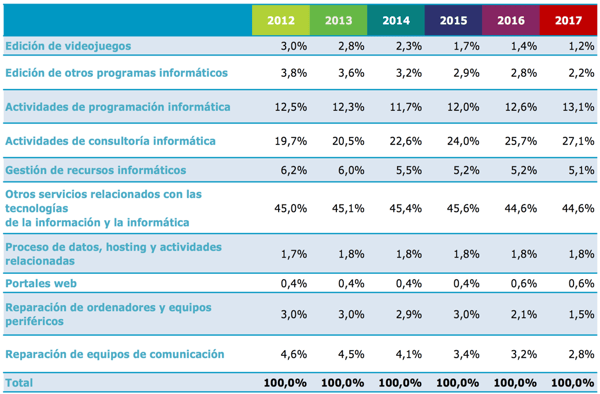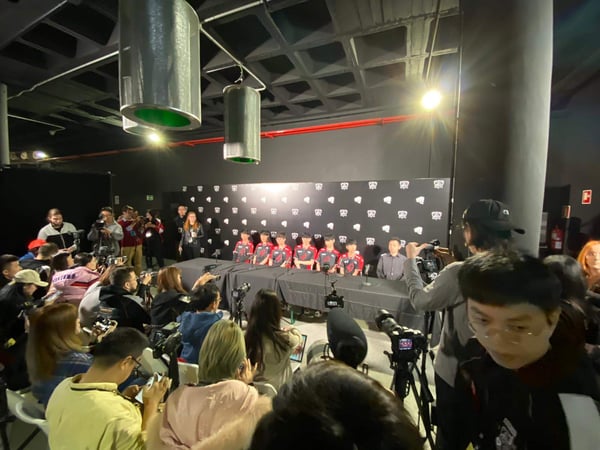I'm going to confess that I am really fortunate to be able to decide where I direct the contents that I investigate and publish with Between Tech and that, for the moment, I have never been told no.
On this occasion, the initial proposal I made them was to deepen some data that appeared in the research I carried out at the beginning of the year on Offers of technological work in computer science most in-demand.
This data was contrary to the current of the rest which talked about increasing jobs and specifically are:
- The repairing of computers and peripheral equipment
- The management of IT resources
- The publishing of other IT programs
- The publishing of videogames

Data source: ONTSI
Do not bite off more than you can chew
What the four previous points have in common is that the number of jobs is gradually decreasing, but their characteristics are so wide and diverse that my initial proposal to deal with the four I have decided was unfeasible if I did not want to fall into a "generalissimo" that provided the reader with very little.
The fate of the technology community
Having decided, then, to opt for only one of the four initial points to be discussed, I found the following problem; that of not knowing which one to choose. When I was in this state, the TarugoConf Conference appeared, in which I participated as a volunteer and where I met today's interviewee; Juan Antonio Tejada.
 Juan Antonio is 22 years old, something that I do not usually emphasise when I talk to someone, but in this story, I think it makes perfect sense to talk about his age, and mine.
Juan Antonio is 22 years old, something that I do not usually emphasise when I talk to someone, but in this story, I think it makes perfect sense to talk about his age, and mine.
Apart from that I strongly ask you to read the professional profile of Juan Antonio to ask you, as I did, what I did at his age.
Just by joining someone with the magnificent CV and attitude of a person of 22 years with another of 43 (me), I can tell you that it is worth rolling up and signing up for this type of experience in the technological community from positions such as a volunteer, which you may no longer consider or leave for the "younger ones".
The point
Juan Antonio is who I was looking for and who opened up my mind as a mother and as a researcher, who was looking for meaning to the decreasing data of the developer's job in video-game publishing in Spain.
1.- Video-game publishing in Spain
1.1.- Stakeholders
Juan Antonio works specifically in e-Sports and tells me about the main stakeholders in this world in particular and in general the world of video-games.
These stakeholders are important to better understand how this world works, so it is important to know the role of the "Publisher". In a very descriptive way, we will say that they are the ones who “bring home the bacon” , they have the intellectual property of video-games, that is, they are the ones who decide which video-games they are going to invest in and, therefore, those who are going to need investment and associated jobs.
>>Listen Audio<<
1.2. - The video-game business model
Video-game development positions are decreasing and that is undeniable but reading that it is a sector in decline in our country and that only its consumption is growing, not its production, in the opinion of Juan Antonio it is not correct and he sums it up very well with the phrase he uses as an analogy:
"Matter is neither created nor destroyed,
it transforms”
This explains how the video-game business model has changed and also the type of jobs that are needed, where the developer is only part of a much larger framework.
With regards to the state of the current video-games business and how it has changed, I recommend that you listen to this audio, a little longer, to Juan Antonio because it is worth understanding.
I, for my part, call this audio; understanding the current video-games business model in just over 5 minutes:
>>Listen Audio<<
1.3.- Positions in the video-games sector
But what are the positions that specifically move around the video-games sector ?; Juan Antonio explains it very well through the example of the fourth and semifinal phases of the World Video-game Championships “League of Legends” (link: https://www.esportsbureau.com/vista-alegre-worlds-19/) that have been played in October and November in the “Palacio de Vista Alegre” in Madrid.
The list of positions is endless and you will be surprised:
>>Listen Audio<<

1.4.- The importance of psychology in the business model
Inevitably, positions related to psychology appear in the model of this type of business.
The game has apsychological component that is integrated within the power to offer free games and that are monetised by designing purchase strategies in this regard.
To sum it all up, addiction of certain types of player profiles is integrated into the business model of a game, just as we explained before, it is the current model in which different companies compete. That's how it is and we will see Juan Antonio's recommendations regarding education in this regard.
>>Listen Audio<<
1.5.- A detailed business outlook of Spain
Neither black or white, but grey:
On the one hand, it seems that the conversation is focused now on dismantling, that the Video-Game Sector is declining in Spain since, as we explain, there are many associated positions that are not seen in the figures we look at if we only care about developers.
But, on the other hand, it seems that we are talking about small , very volatile companies that are created and destroyed under the personal motivation of players or fans. This is the feeling I get when reading data and Juan Antonio gives me more clarity, which I advise you to keep in mind if you want to invest in business in this sector:
>>Listen Audio<<
2.- Bonus track for mothers and fathers
I will start by saying that this part complements (Bonus Track) the article itself and may only be of interest for a very specific reader profile, but, as in my case it has had a great impact the conversations with Juan Antonio, I think it may be interesting for other mothers and fathers whose children are playing or starting to play video-games and that we are surprised by certain habits (such as that they like to watch videos of “YouTubers” playing), we do not understand (for example, see how a stadium is filled with thousands of boys and girls to see, again how other people play) or, even, we fear these ones slightly (the dreaded consequences of addiction or a professional career).
2.1. - Key points
Juan Antonio, too, is part of a training programme for mothers and fathers when it comes to video-games and is extremely educational in everything he explains to me and from which I extract some key points about it and which are complementary with their super-paedagogical audios.
1.- Prohibition leads to desire: perhaps it is something we all know but it is worth remembering and hearing it again: >>Listen Audio<<
2.- Sit with your children to understand before prohibiting: this is key and it is taking time before deciding to prohibit something: >>Listen Audio<<
3.- My educational action as a mother/father in the game: well, now that I have sat down with my child, what do I do if I don't like something?: >>Listen Audio<<
4.- Personal dressing-down and, which I appreciate, and an essential lesson, for everyone: I recommend that you listen to it in its entirety because it is pure gold: >>Listen Audio<<
2.2. - Fear of game addiction
We arrived at the part I anticipated when talking about the business model where playing is mostly free and is monetised from the design devised by psychologists so that a percentage of players buy, at different levels, to make it a profitable product and in where we talk about ethics and addiction to gambling.
I recognise that I am a mother who reads and hears news related to the problems of gambling addiction and the proliferation of bookmakers , and I am afraid that if my children, currently 6 and 8 years old, start playing certain games they can end up hooked to bets when they are 18 or 20 years old.
So , in this sense, I am very grateful to have met someone who explains and advises me about it, since, their explanations are in total harmony with what I know well from my training in Paedagogy .
>>Listen Audio<<
2.3. - Horror my kids want to be professional players or YouTubers
Another fear that many parents have is that our children want to turn their hobby into their professional career and, this topic also comes up in the conversation. In the end, my conclusion is that it closely resembles the professional life of many other high performance/concentration professions that I would also fear that my children would choose:
>>Listen Audio<<
2.4. - Final commitments I subscribe to and recommend
To finish this article, Juan Antonio makes me a very specific proposal that I take up and sign up for as part of my motherly duties, which is to go to an event and see all this with my own eyes, because I fully agree, you always have fear of the unknown.
Thanks Juan Antonio,
I hope you have more talks like this


